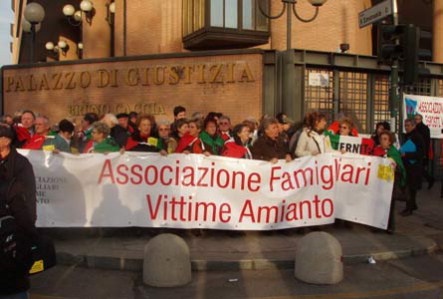27 November, 2014On 19 November 2014 the public prosecutor of the Italian Supreme Court of Cassation has overturned the Turin court decision condemning the Swiss billionaire Stephan Schmidheiny, one of the owners of Eternit Group, claiming the sentence is not applicable because of the long period of time that has passed since the crime took place.
In July 2011 at the 51st court hearing in Turin, the 67-year-old Swiss billionaire Stephan Schmidheiny, and the Belgian Baron Louis de Cartier de Marchienne (since deceased in May 2013), owners of the Eternit group, were charged of wilful failure to protect their employees and factory neighbours, resulting in thousands of deaths from asbestos. http://www.industriall-union.org/archive/imf/eternit-owners-risk-20-years-jail-sentence. Eternit produced asbestos-cement and other products at plants in Europe, Africa and South America.
The court hall exploded with whistles and shouts: “Shame! Shame!” after the decision has been announced. The dismissal of the accusations against the group owners is a slap to almost 3,000 victims who according to the Turin Prosecutor’s office were either working at the four Italian Eternit plants in Cavagnolo, Casale Monferrato, Rubiera near Reggio Emilia and Bagnoli, near Naples, or lived near them. The decision also cancels the compensatory payments to the victims and their families.
The Italian affiliates of IndustriALL through their national union federations CGIL, UIL and CISL actively contributed to the hearings of the trial against Eternit and were closely cooperating with the Italian Association of Relatives of Victims of Asbestos (AFEVA).
Maurizio Marcelli, head of health and safety department of FIOM-CGIL called the decision of the Court of Cassation “a shameful page of the Italian legal system”. “The judges preferred to hide behind the “quibble” of a statute of limitations, defending an abstract right rather than do justice to many workers and citizens who died because of asbestos."
Giuseppe Farina, general secretary of CISL confederation, said, "This request for statute of limitations analysis is surreal as the harmful effects from exposure to asbestos in many cases continue for more than 40 years and therefore have nothing to do with the timing of judicial proceedings.”
Paolo Carcassi, general secretary of UIL commented, “Since 1992 our country has banned the use and commercialization of asbestos. However the asbestos related diseases have a latency of more than twenty years, therefore to invoke the statute of limitations on the basis of when the asbestos has been produced rather than when the disease has manifested itself means to declare the impunity of those who criminally knew that it was a carcinogenic material and indeed did everything to hide this fact, resulting in thousands of deaths."
The Italian unions jointly with the Association of Relatives of Victims of Asbestos are not going to give up; and will continue to pursue legal proceedings on the basis of accusations of voluntary homicide.
